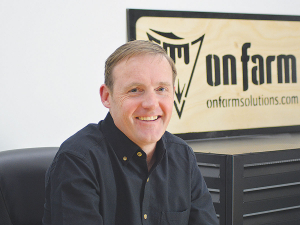Fieldays hold out the begging bowl
OPINION: When someone says “we don’t want a handout, we need a hand up” it usually means they have both palms out and they want your money.
 Automated teat-spraying has become far more commonplace in rotary dairy sheds, says Gary Arnott, founder and chief executive of Onfarm Solutions.
Automated teat-spraying has become far more commonplace in rotary dairy sheds, says Gary Arnott, founder and chief executive of Onfarm Solutions.
Canterbury based dairy tech firm Onfarm Solutions says it has developed an effective, consistent automated tear spraying system for herringbone dairy sheds.
"Automated teat-spraying has become far more commonplace in rotary dairy sheds, with much of that being our own technology," says Gary Arnott, founder and chief executive of Onfarm Solutions.
"However automated systems in herringbones have been very hit and miss affairs, with wasted and poorly targeted spraying. Our Teatwand Stepover System changes that."
Often existing herringbone teat spray systems would be set up just outside the dairy exit, exposed to wind and air movement that required significantly larger amounts of spray to compensate for lack of accuracy.
When Covid shut down an overseas project Onfarm Solutions engineers were working on, their attention refocused upon the yet to be cracked herringbone solution.
Advances in optical sensor technology and control systems enabled a design that can measure where and when a cow is passing through the exit lane post-milking, with the programme selecting the optimal spray sequence for the four nozzles in the system.
"The design has had to incorporate the usual challenges that go with dairy cows being large animals with a variety of body shapes, movement patterns and temperaments, and the system's response to their movement reflects this," says Arnott.
If the cow is moving slowly through the exit only two nozzles will activate for the spray sequence, and a faster pace will result in all four nozzles deployed for assurance of full teat coverage. Should the cow stop walking, the spray system sprays the teats once the cow walks through once only.
Arnott says the combination of sensor technology, smart programming and well-founded engineering principals that established the company's rotary teat spray systems have been encased in a robust hardware design, built to take the impact dairy herds can inflict on equipment.
This includes a solid stainless-steel casing that can take a cow’s full weight, with an inbuilt nozzle wash system to clear effluent from the sprayer’s nozzles for continuous clear spray flow.
The design was proven over the past dairy season on a North Canterbury dairy unit that provided in-field feedback for final design tweaks.
Onfarm Solutions engineers have been able to apply some of their learnings from the company’s highly successful Teatwand Exact automated spray system used in rotary dairies to the Stepover.
Over 1,200 of the Teatwand systems are now in use globally.
As in rotary platforms, teat spray has proven to be a hit and miss job in herringbones when done both manually and automatically, says Arnott.
A survey of manual teat spray practices done a decade ago found two out of every three farms were using the wrong dilution rate, and only one in three got good coverage of all four teats.
This is despite numerous studies that prove accurate teat spray will reduce new mastitis infection rates by 50%. Mastitis in turn is one of the main health issues in dairy herds, costing New Zealand dairy farmers about $180 million a year.
Arnott says the Teatwand Stepover is backed by the company’s extensive sales and service network. He’s highly encouraged by the number of forward orders received by his company as farmers consider their capital investment programmes for the coming dairy season.
Bovonic says a return on investment study has found its automated mastitis detection technology, QuadSense, is delivering financial, labour, and animal-health benefits on New Zealand dairy farms worth an estimated $29,547 per season.
Pāmu has welcomed ten new apprentices into its 2026 intake, marking the second year of a scheme designed to equip the next generation of farmers with the skills, knowledge, and experience needed for a thriving career in agriculture.
One team with 43 head, including a contingent from Mid Canterbury, are reflecting on a stellar NZ DairyEvent.
Fonterra farmer shareholders have approved the mechanism for a $2/share capital return expected from the sale of its global consumer and associated businesses.
Trainees in the horticulture industry studying towards a certificate or diploma can now apply for Horticulture New Zealand's (HortNZ) 2026 Industry Training Scholarships programme.
OPINION: The first three Global Dairy Trade (GDT) auctions have been a morale booster for farmers.
OPINION: Staying with politics, with less than nine months to go before the general elections, there’s confusion in the Labour…
OPINION: Winston Peters' tirade against the free trade deal stitched with India may not be all political posturing by the…